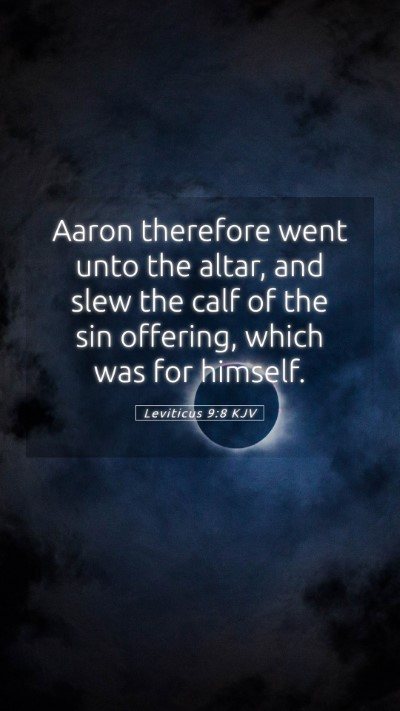Understanding Leviticus 9:8
Leviticus 9:8 states: "Aaron therefore went unto the altar, and slew the calf of the sin offering, which was for himself." This verse marks a pivotal moment in the establishment of priestly duties in ancient Israel, showcasing the significance of atonement and the initiation of sacrificial practices.
Bible Verse Meanings
In this passage, Aaron, designated as a high priest, approaches the altar to perform an essential ritual for himself and the people. The act of slaying the calf signifies the weight of sin and the necessity of sacrifice to seek forgiveness and ensure divine favor.
Bible Verse Interpretations
This verse illustrates the profound role of the priest in the spiritual life of the Israelites. It emphasizes the sacrificial system instituted by God, indicating that before Aaron could minister on behalf of the people, he first had to acknowledge his own need for atonement.
Bible Verse Understanding
- Atonement: The act of slaughtering the calf signifies the need for atonement for sins, highlighting that all have sinned, including the leaders (Romans 3:23).
- Priestly Responsibilities: Leviticus 9:8 showcases the duties bestowed upon Aaron, marking the start of a new priestly order aimed at mediating between God and the people.
- The Altar's Significance: The altar represents a meeting place between God and humanity, where sinful man can seek reconciliation through sacrifice.
Bible Verse Explanations
Several public domain commentaries provide rich insights into this verse:
- Matthew Henry: Henry indicates that Aaron's action is emblematic of the need for a mediator and the seriousness of sin. The offering made by the high priest serves as a powerful reminder of the gravity of sin and the grace required for reconciliation.
- Albert Barnes: Barnes emphasizes the importance of the sin offering and its role in the ceremonial law. He points out that it was essential for the priest to first deal with his own sins before addressing the sins of the people.
- Adam Clarke: Clarke points out that this verse underscores God’s provision for forgiveness through sacrificial offerings. He notes it illustrates the principle that leaders are equally accountable before God.
Key Themes and Lessons
This verse can be broken down into several key themes applicable not only in historical context but also in modern spiritual application:
- Humility: Recognizing our own need for forgiveness before ministering to others.
- Accountability: Leaders in faith must acknowledge their shortcomings and seek redemption.
- God's Mercy: The sacrificial lamb as a symbol of Christ's ultimate sacrifice for humanity’s sins.
Related Bible Cross References
- Exodus 29:38-42 - Instructions for daily offerings.
- Hebrews 9:22 - The necessity of blood for remission of sins.
- Romans 5:8 - God’s love demonstrated through Christ’s sacrifice.
Conclusion
Leviticus 9:8 is a foundational verse that sets the framework for understanding the importance of sacrifice in the law and foreshadows the coming fulfillment in Christ. By studying this passage and its implications, believers can gain profound Bible study insights and appreciate the depths of Biblical exegesis.


